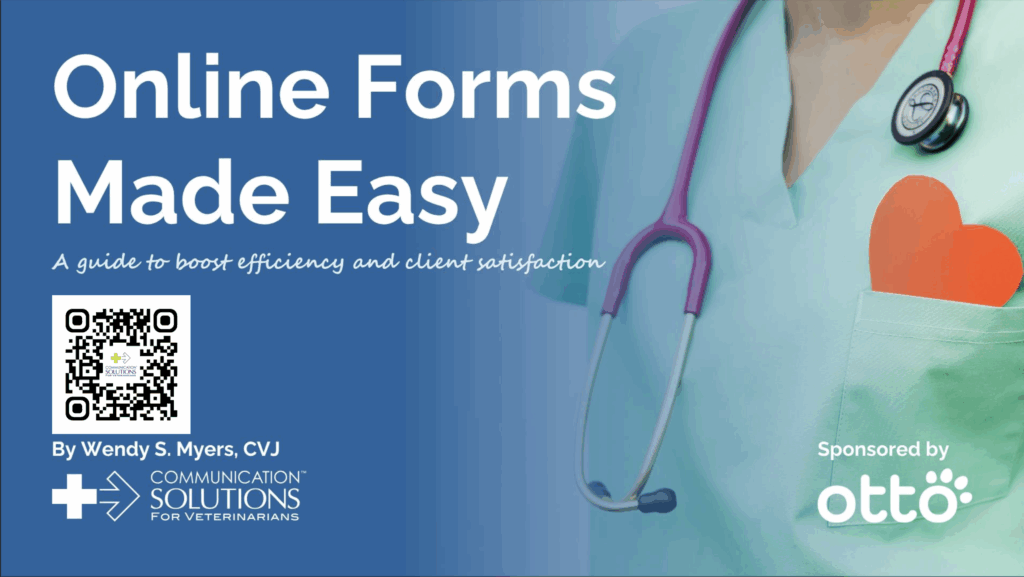
Veterinary Digital Forms Made Easy: A Guide to Boost Efficiency and Client Satisfaction
Insights from Wendy S. Myers, CVJ and CEO of Communication Solutions for Veterinarians
Veterinary teams everywhere are stretched thin, and the pressure to deliver fast, friendly, and accurate client experiences has never been higher. That’s why clinics are increasingly turning to digital workflows — especially online forms — to remove friction on both sides of the exam table.
In our recent webinar, Online Forms Made Easy, the Queen of Scripts herself, Wendy S. Myers, CVJ, joined Otto to break down exactly how online forms improve efficiency, reduce no-shows, and create better client experiences. Using real clinic data, practical scripts, and proven communication strategies, Wendy showed attendees how to transform one of the most frustrating parts of clinic operations into one of the most powerful.
Here’s a full recap of what she covered — and how your clinic can put these tips into action.
Why Online Forms Are Becoming the New Standard of Care
Wendy opened with a simple truth: paper forms slow everyone down. Between illegible handwriting, missing information, long check-in lines, and tedious manual entry, paper forms drain time from teams that already don’t have any to spare.
According to the webinar summary, digital forms solve these problems immediately. Clinics using Otto Flow reduced new client call lengths by 67% — dropping calls from 15 minutes to just 5 minutes. Rolling Hills Veterinary Service cut surgical check-in times in half: 30 minutes for all surgical patients vs. one full hour using paper.
And accuracy? Paper forms carry a 32 percent error rate, while digital forms drop that to just 1 percent. No lost paperwork. No handwriting guesswork. No double-entry.
But the benefits extend beyond the team. Online forms also reduce client anxiety by allowing pet owners to complete paperwork at home, on any device, without the pressure of lobby check-in rushes.
Better Communication = Better Appointments
One core theme of Wendy’s presentation was preparation. When clients submit forms ahead of time, doctors and technicians gain 10–15 extra minutes per appointment by skipping basic history-taking and jumping straight into meaningful conversation.
This doesn’t just make appointments more efficient — it makes them more personal. With forms and AI scribe tools handling documentation, teams can focus on face-to-face communication instead of typing notes.
Wendy emphasized that millennial pet owners (now more than one-third of pet-owning households) expect digital-first communication and often choose clinics based on the ease of scheduling and online forms.
Which Forms Matter Most? Wendy’s Must-Have List
Wendy highlighted a priority list based on what slows most clinics down:
1. New Client Forms
Sent immediately at booking, these forms give the team everything they need to prepare the medical record in advance. They also contribute to smoother first impressions — which Wendy refers to as the “first date” with your clinic.
2. Anesthetic Consent
Sent two days before the procedure, they significantly reduce day-of delays and ensure fasting instructions are understood before arrival.
3. Wellness Forms (Adult + Senior)
Wellness questions help uncover mobility concerns, vision changes, behavior shifts, and other issues clients may not think to report. These forms set the tone for high-value conversations during exams.
4. Health Certificate Forms
By collecting destination, airline, and travel details in advance, staff can research requirements early — transforming what used to be a 60-minute appointment into a 30-minute one.
5. Website Forms (24/7 Access)
Such as:
- Prescription refill requests
- “Ask us a question” forms
- These reduce phone volume and let clients reach the clinic on their own schedule — even at 2 a.m.
Wendy’s Strategies for Getting Forms Completed On Time
Getting forms sent is one thing. Getting them returned is another. Thankfully, Wendy offered several battle-tested tactics clinics can implement right away:
Explain expectations during scheduline
Let clients know exactly when they’ll receive the online form and that it must be completed before the appointment.
Use deadlines and a 5-part confirmation workflow
Wendy’s best-practice schedule includes confirmation messages sent immediately, two weeks out, five days out, two days out, and on the day of the appointment — each with a clear CTA and often a button (which boosts response rates by 15%)
Use the doctor’s name in reminders
A powerful script from Wendy’s deck instructs CSRs to begin follow-up calls with:
“Dr. Smith asked me to call you…” Clients never want to disappoint the doctor.
Always send a backup text
Since 67 percent of people don’t listen to voicemail, a follow-up text with the form link is essential.
Have tablets ready for day-of completion
For clients who struggle with technology, staff can assist at check-in using clinic devices.
Reducing No-Shows With Online Forms & Reservation Fees
Wendy also dove into the financial impact of no-shows, citing a national average no-show rate of 11 percent — equal to $66,000 per doctor per year in lost revenue.
Digital tools cut this problem in half.
Online forms, online scheduling, automated reminders, and pre-visit reservation fees all contribute to fewer last-minute cancellations.
Pro tip: Never call it a “deposit.” Wendy recommends using “appointment reservation fee” or “prepayment” to meet legal requirements and avoid misunderstandings. And instead of collecting payment over the phone, clinics should send a secure payment link to avoid the higher fraud and fee risks associated with card-not-present transactions,
How Otto Makes Online Forms Even Easier
Wendy closed out the session by highlighting the capabilities of Otto’s integrated forms and communication tools, including:
- Real-time PIMS writebacks
- Two-way texting
- AI Scribe for automated SOAP summaries
- Automated confirmation workflows
- Overdue form tracking
- Secure online payments
With these tools working together, clinics spend less time chasing paperwork and more time delivering care — all while shrinking call volume by up to 70 percent.